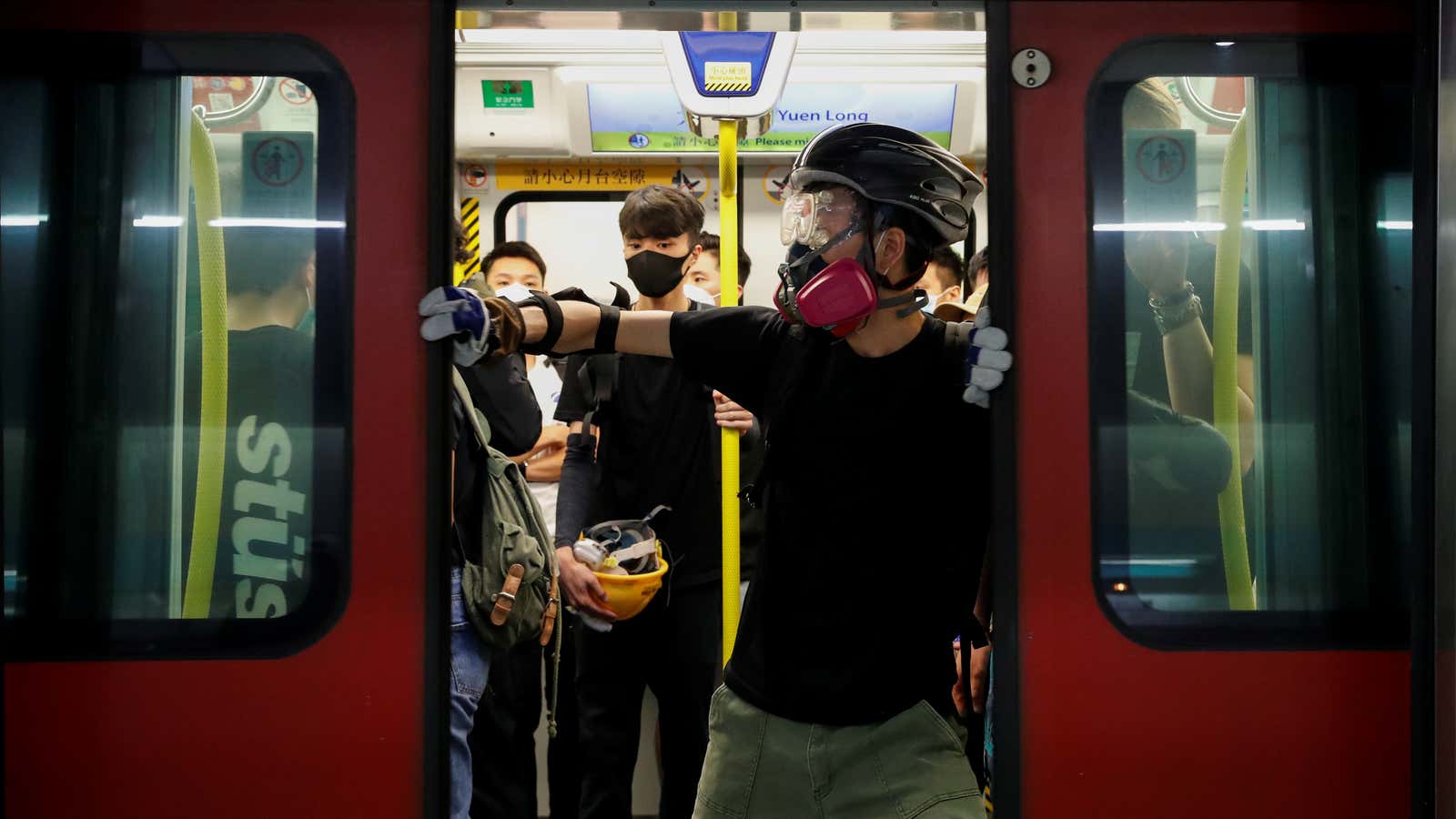Hong Kong’s extensive subway system transports millions of passengers everyday. Lately, it’s also been been whisking protesters to and from sites of demonstration across the city. And China is none too pleased about that.
Known as the Mass Transit Railway, or MTR, the city’s majority government-owned metro has long been held up as a global gold standard of efficient train service, famous for its almost-perfect on-time rate of 99.9%. In a city where car ownership rates remain low, the MTR forms the backbone of urban mobility for much of the population, with subway rides accounting for more than 40% (pdf) all daily public transportation trips. Even its expansions are fairly punctual, with construction on an extension of the blue Hong Kong island line starting in 2009 and first of three new stations opening on time five years later.
Since Hong Kong’s ongoing protests kicked off in June, the MTR has been protesters’ transit mode of choice. Ahead of mass rallies, stations become so crammed full of passengers that it can be almost impossible to enter or exit. And during more fluid and unpredictable protests, black-clad and helmet-wearing protesters zip around the city, appearing and dispersing quickly as they play a game of cat-and-mouse with the police. Protesters have also disrupted train services and held tense stand-offs at stations, and one train station was the site of a brutal armed mob attack against civilians in July.
As China has increasingly expressed its displeasure at Hong Kong’s ongoing political turmoil, it has taken aim at companies that it deems to be deviating from the party line. The first major firm to take the hit was Cathay Pacific, which was slapped with crew restrictions by the China’s aviation regulators and whose CEO, Rupert Hogg, abruptly resigned under what many have seen as political pressure. The flagship carrier has had to crack down on its employees, too, including its budget arm’s labor union leader over Facebook posts that showed support for the protests.
Last week, the Communist Party mouthpiece People’s Daily lashed out at MTR in a commentary, accusing it of being an “accomplice to rioters” by allowing them to “escape for free” after multiple incidences in which the railway operator dispatched special trains to pick up protesters late at night—never mind that those arrangements were often made at the request of the police. The company’s CEO has reportedly come under “tremendous pressure” from Beijing to get tough on protesters, according to the South China Morning Post.
Just two days after the People’s Daily op-ed (link in Chinese), MTR made the unprecedented move of temporarily shutting down a number of stations over the weekend across two metro lines close to where legally authorized protests were scheduled to be held. While the firm said the move was meant to “ensure the safety of passengers and our staff,” critics saw it as a blatant violation of citizens’ freedom of assembly and speech, not to mention the inconvenience posed to tens of thousands of nearby residents who did not take part in protests. Addressing questions from the press today (Aug. 26), the transport minister denied that MTR’s weekend closures were a response to pressure from China.
By targeting such a large transit company on which millions of people depend daily, it appears that China may be trying to divide and conquer by turning public sentiment against protesters. But so far, it’s unclear whether this strategy will play out in China’s favor. On Sunday (Aug. 25), a group of protesters stepped off a train to a hero’s welcome after a night of tense clashes with police. Meanwhile, protesters quickly took to calling the MTR “Communist Party Rail,” superimposing a hammer and sickle over its logo. The company drew further ire when it was revealed that it had arranged a special train service for police on Saturday (Aug. 24), even though the line was closed to the public.
Like Cathay Pacific, MTR does business with the mainland Chinese market, though to a smaller degree. According to its 2018 annual report, it derived nearly 930 million Hong Kong dollars ($120 million) in revenue from its businesses in mainland China, accounting for 1.7% of its total revenues (.pdf, p.83). While not a significant percentage, MTR operates a number of lines and properties across major cities in China, including a 49% stake in four lines of Beijing’s subway system. Its earnings from businesses in China grew by more than 44% last year, and it’s actively looking to expand its investments and operations on the mainland, according to the 2018 report.
